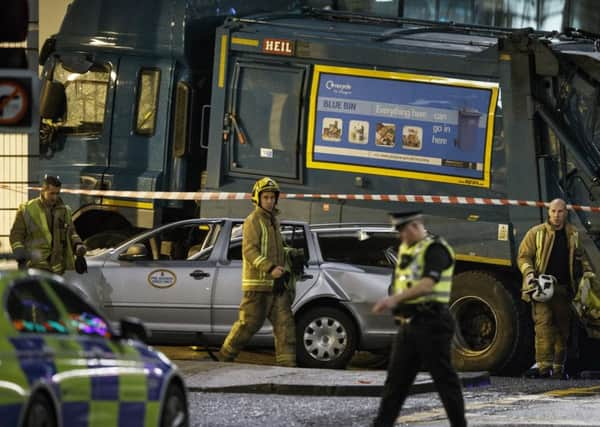Glasgow bin lorry driver dogged by medical issues


Harry Clarke was driving the council truck in Glasgow city centre on 22 December last year when it went out of control after witnesses reported he appeared to lose consciousness at the wheel.
A fatal accident inquiry set up to investigate the tragedy was told that Mr Clarke did not disclose his medical history when completing a health questionnaire as part of his job application to be a school bus driver for Glasgow City Council in 2010.
Advertisement
Hide AdAdvertisement
Hide AdIt has been shown that the medical form used by council recruitment asked applicants to answer yes or no if they had experienced conditions including fainting, light headedness, depression and anxiety.
In cross-examining witness Geraldine Ham, a human resources manager at the council, Dorothy Bain QC read from Mr Clarke’s medical records and documented around 30 instances starting in June 1976 when he had seen a doctor due to issues including dizziness, vertigo, anxiety and nervousness.
There were also two cases of “vasovagal” recorded, one in 1989 when Mr Clarke worked for Tennent Caledonian Breweries and another in 2010 when he worked for First Bus, the inquiry heard.
The inquiry previously heard from witnesses that Mr Clarke had suffered a “blackout” at the wheel of a bus in April 2010 while he worked with First Bus, but a doctor’s note shown to the witness today stated that Mr Clarke said he had lost consciousness for five seconds in his work canteen rather than on a bus.
Ms Ham said the council was not made aware of any health conditions during Mr Clarke’s recruitment.
Ms Bain, who is representing the family of crash victim Jacqueline Morton, asked Ms Ham: “Am I right to surmise that from at least the 1970s, Mr Clarke has reported a history of dizziness?”
She added: “Would you expect that to be disclosed in a medical questionnaire for a man applying to drive a school bus?”
The witness agreed.
Ms Bain said a “bond of trust” was expected between the council and any job applicant. Particularly so if there is a medical condition that affects your ability to do the job safely,” the QC added.
Advertisement
Hide AdAdvertisement
Hide Ad“And particularly so if it puts other people’s lives at risk.
“He would never have been given the job if he told the truth, am I right?”
Ms Ham answered “yes” and agreed that six people would not have lost their lives if Mr Clarke had “told the truth”.
Erin McQuade, 18, and her grandparents Jack Sweeney, 68, and Lorraine Sweeney, 69, from Dumbarton, West Dunbartonshire, were struck and killed by the vehicle.
Stephenie Tait, 29, and Ms Morton, 51, both from Glasgow, and Gillian Ewing, 52, from Edinburgh, also died in the accident which took place in Queen Street. Earlier, the inquiry had heard that Mr Clarke had “satisfactory” references when he joined Glasgow City Council but they are no longer held on record.
Ms Ham said references from previous employers were sought during the job application process but Mr Clarke’s are “not held in his file”.
Questioned by Solicitor General Lesley Thomson QC, Ms Ham said: “We’ve not been able to find them.”
Council e-mails shown to the inquiry from March 2011 stated that references had been received for a series of job applicants, including Mr Clarke.
A council manager dealing with the issue replied to the e-mail, writing: “I can confirm that I am satisfied with all the references.”